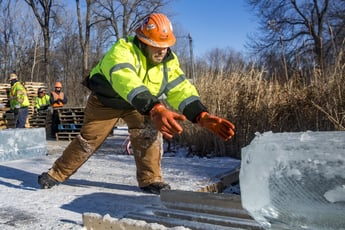What low-voltage cable is right for the job? - Southwest
There are a number of different low-voltage cable solutions available to help you meet the needs of...


It’s easy to get caught up in the daily grind of working on a construction site. Getting into a routine of working all day, going home for the night, and heading back out for more work the next day. However, there are times when problems arise that need immediate attention or could put your job at risk if not addressed immediately. Having the right tools on hand can help you get these problems solved quickly and keep your project moving forward without interruption. It’s not an exaggeration to say that having the proper industry-specific tools can make all the difference in the world.
Every project presents its own unique obstacles and issues. Even though you can’t predict every single problem that might arise, you can make sure to be as prepared as possible. Here are some tips on how to keep yourself and your crew ready for anything:
Keep a backup tool. You never know when an essential piece of equipment is going to break or malfunction, so having a backup plan is always the smart thing to do. If you’re buying new tools for your job site, consider buying two so that one can stay in reserve while the other gets used. It’s also a good idea to keep spare batteries on hand just in case they’re needed—and don’t forget about power cords!
Invest in quality products made by reputable manufacturers that have been around for a while (or check out their warranty policy!). If you buy cheap tools that break easily it could end up costing more money than if you’d just bought higher quality tools upfront.
Make sure everything has its own place on your work vehicle. this way everything goes back where it belongs after use instead of getting lost somewhere between job sites. This makes finding things easier when needed next time around.
Tools help you do the job better, with fewer mistakes, which means less time fixing things and more time moving on to the next project. Tools also reduce injuries. If you’re able to use a tool correctly, it’ll keep your body safe from harm while you’re working on your project. In addition to reducing injuries such as a hydraulic lift to pick up gate operators, there are small projects of a job that could benefit from using the proper tools as well: bolting down the gate operator may not seem like much work but using a ratchet instead of a pair of pliers ensures proper installation without stripping the nuts and having banged up knuckles!
Having backups on-site can’t be thought of as a privilege, it’s a necessity. This can save your company time and money by avoiding production interruptions as well as costly repairs or replacement parts. A good backup tool should be just like its primary counterpart: it should have the same features, capabilities, limitations, and cost structure. If your primary tool is expensive and proprietary, so should be its backup!
The best way to ensure that you have effective tools available when needed is through planning ahead of time—before an emergency strikes. At least once per year, review all of your equipment inventories with a critical eye toward their capabilities versus needs; do they meet current business objectives? Are they being used efficiently? Do any need replacing or upgrading?
If you’re already a well-seasoned dealer, then you know that quality tools make the job easier and safer. If you’re new to the industry, here are some things to keep in mind:
When buying tools for any job, always buy quality tools rather than buying cheap ones. Cheap tools are more likely to break and cause injuries when they do fail.
Quality tools will last longer than their cheaper counterparts. This is because they were made from better materials that are more resistant to wear and tear over time; therefore, they require less maintenance and can withstand harsher conditions like extreme temperatures or heavy use without causing damage. In other words, when it comes down to it: You get what you pay for!
Don’t underestimate the importance of having the right tools for the job. While they may seem like an investment, they are actually a necessity. Tool failure can cause serious injury, and it can also result in a lot of downtime, missed deadlines, and even legal action against you if someone gets hurt on your watch.
You shouldn’t have to worry about any of this when it comes to your tools—you should only have to worry about doing phenomenal work! When you use tools that are effective and well-made, then there’s nothing standing between you and success at whatever project you’re working on next!
So, do you have the right tools for your job? When you have the right tools for the job, you can complete tasks faster and more efficiently while staying as safe as possible. It may seem unnecessary to buy some of these items, but they can save you time and money in the long run. What are your favorite tools that you can’t live without?

Daniel Andermann has over ten years of industry experience in the security industry with a start in fence contracting. He is currently based in Baton Rouge, LA.


There are a number of different low-voltage cable solutions available to help you meet the needs of...


Winter months can be challenging for many small businesses. Sales tend to slow down, and it can...
Leave a Comment